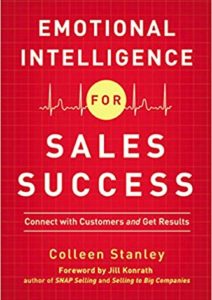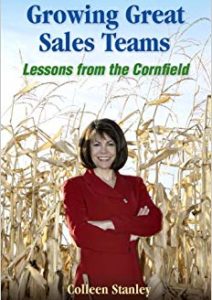Good salespeople take the time to really know their competition, and invest the necessary time to evolve tactics and strategies to overtake competitors. They come up with value propositions and questions designed to illuminate gaps in competitors’ offerings–without ever mentioning competitor names. They share carefully crafted stories about happy clients who benefit from their company’s products and services.
But salespeople are often defeated by their biggest competitor, the hidden competitor named status quo. This defeat comes about because of hard selling skills and, more often, a salesperson’s lack of emotional intelligence (EI) and their general inability to manage emotions.
Salespeople become excited (emotional) upon hearing prospects utter phrases such as “We believe in the practice of looking and comparing to see what’s out there every few years” or “We really need to take it to the next level.” At this point, positive emotions take over and start running the meeting, with the result that the excited salesperson ceases asking qualifying questions.
The salesperson agrees to “put something together” and meets with the prospect to share recommendations. This meeting is entirely different from the first one. It’s as if another prospect showed up to the meeting. “We’re not sure if we are ready … timing isn’t quite right … call us in 10 years. … This is a higher investment of time and money than we thought. … I think we will wait to invest.”
Another practice proposal is lost to status quo and a lack of emotional intelligence skills.
Here are two EI skills to learn and develop to eliminate those discouraging practice proposals.
1. Emotional self-awareness. Ask yourself the truth-telling question to raise your awareness. When do you start buying the buying signals during a sales call and stop asking further qualifying questions?
Next, put a strategy in place to execute better selling behaviors. One such strategy is a simple checklist of questions to ask in every sales meeting. If all the questions aren’t asked and answered to your satisfaction, there may be no reason to take a next step.
2. Apply the EI skill of reality testing and further check your prospect’s commitment to change. Talk is cheap and your job during a sales call is to make sure you are working with prospects that take action.
Further qualify your prospect on their commitment level by asking questions such as:
- In order for us to make the best recommendation, we need to meet with X, Y and Z. Can you help me get those meetings set up? (Committed prospects give you access to other buying influences.)
- Who and where will we encounter the most resistance to change? (Committed prospects will share the truth.)
- Tell me about a previous situation at the company where change was very hard — and you still accomplished it. (Committed prospects have a track record of commitment to improvement.)
This year, set a goal to stop writing practice proposals. Develop the EI skills of self-awareness and reality testing. And remember, not every prospect deserves to become your customer.
Good Selling!
Pipeliner CRM empowers salespeople to sell with precision. Get your free trial of Pipeliner CRM now.












Comments